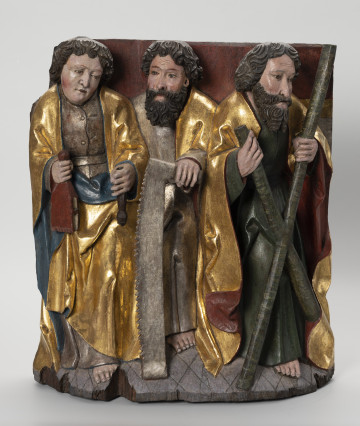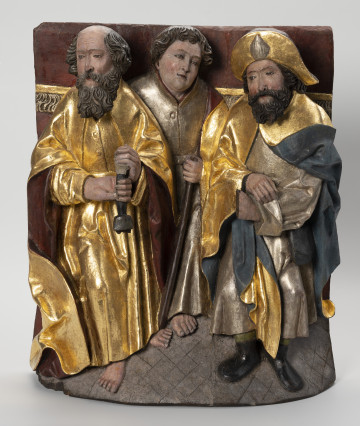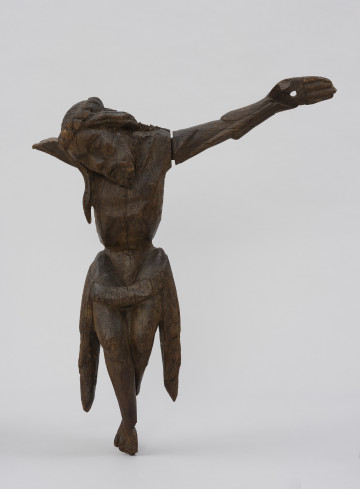
Apostles: Bartholomew, Simon, Andrew
1510 — 1520
National Museum in Szczecin
Part of the collection: Medieval sculpture of West Pomerania
The Carrying of the Cross depicted on one relief of the Passion Altar in Wkryujście refers to the Way of the Cross of Jesus. The Via Dolorosa (Latin: the way of suffering) or Via Crucis (Latin: the way of the cross) leads through the Old City of Jerusalem to the Basilica of Holy Sepulcher. According to tradition, it was walked by Jesus carrying the cross to Golgotha, where he was crucified. It was common practice in the Middle Ages to make a pilgrimage to the Holy Land to experience the Passion of Christ by participating in the Stations of the Cross, which were held every Friday since 1320 by the Franciscan Order. Participation in the service made it possible to obtain a plenary indulgence, i.e., remission of the temporal punishment for sins. Pilgrimages to the Holy Land and accounts of these journeys contributed to the development of services connected with the cult of the Passion in late medieval Europe. Passion-themed works, from pictorial cycles to actual calvaries constructed from the 15th century onwards, corresponded to the theology of following Christ. They also offered the opportunity to make a spiritual pilgrimage to the places sanctified by His blood. The Wkryujście altar dated to about 1510-1520 and was founded by Duke Bogusław X, one of the most important rulers in the history of Pomerania. The ducal foundation seems highly probable not only due to the magnificent character and artistic class of the work. It is also supported by choice of the Passion theme for the altar in the church dedicated to Mary. Chronicles report that Bogusław X made a two-year pilgrimage to Jerusalem in 1496-1498, during which he visited many European courts and fought a fierce battle with the Turkish fleet. The church in Wkryujście, where one of the Duke's residences was located, suffered during a fire in 1473. The new altar dedicated to the Passion of Christ may have been the Duke's foundation for thanksgiving and commemoration after having made a pilgrimage, according to the custom of that time.
Kinga Krasnodębska
Author / creator
Dimensions
cały obiekt: height: 127 cm, width: 108,5 cm
Object type
relief
Creation time / dating
Creation / finding place
Identification number
Location / status

1510 — 1520
National Museum in Szczecin

1510 — 1520
National Museum in Szczecin

1350 — 1375
National Museum in Szczecin
DISCOVER this TOPIC
Museum of King Jan III's Palace at Wilanów
DISCOVER this PATH
Educational path